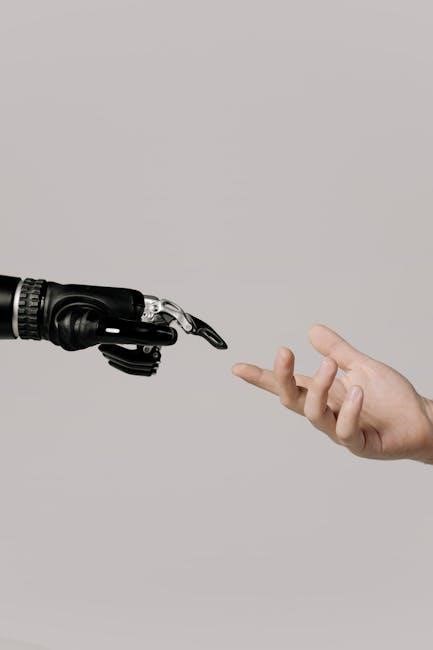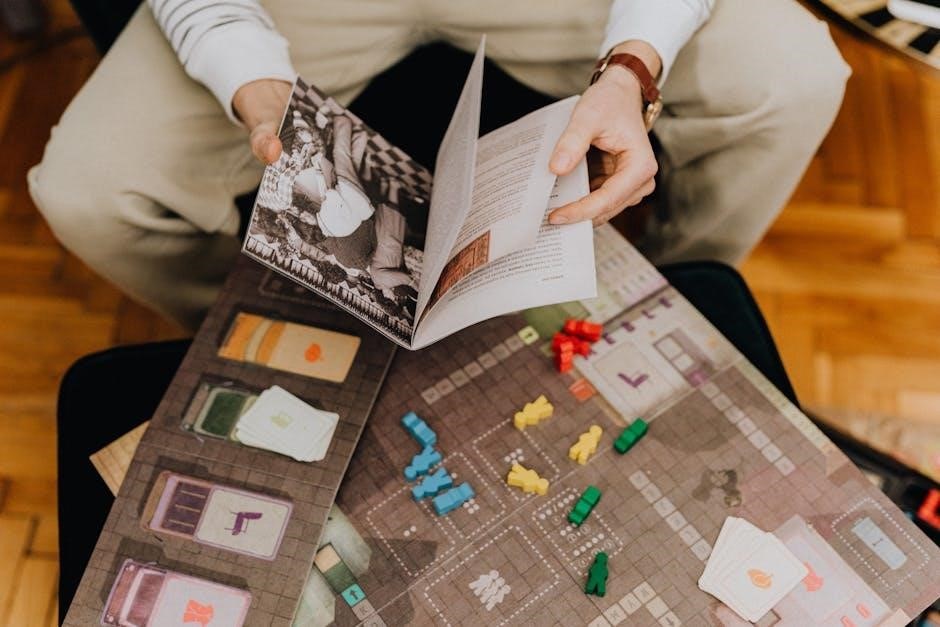Advanced Strategies for Seasoned Players
Seasoned players can refine their skills with advanced techniques like mastering the kitchen line in pickleball, optimizing raiding tactics in Rust, and crafting sophisticated character builds in Pathfinder RPG.
These strategies enhance gameplay efficiency and strategic depth, allowing experienced players to outmaneuver opponents and achieve superior results consistently.
Advanced players can also explore nuanced gameplay mechanics, such as harvesting tactics in Rust or developing opening repertoires in chess, to elevate their performance.

1.1. Mastering the Kitchen Line in Pickleball
Mastering the kitchen line is a critical skill for advanced pickleball players. The kitchen line, a key area on the court, requires precise positioning and strategic play. Seasoned players should focus on staying low, using soft hands, and angling shots to maintain control. Consistently getting to the kitchen line before opponents provides a significant advantage, allowing for dominant volleys and forced errors. Advanced techniques include using third-shot drops and lobs to outmaneuver opponents. Footwork and anticipation are essential for maintaining dominance at the kitchen line. By perfecting these strategies, players can elevate their game and consistently outperform rivals. Continuous practice and adaptability are key to mastering this advanced tactic.
1.2. Optimizing Raiding Tactics in Rust
Optimizing raiding tactics in Rust is crucial for advanced players seeking dominance; Effective raids require meticulous planning, utilizing explosives and rockets strategically, and coordinating with teammates. Seasoned players should focus on identifying weak points in enemy bases, exploiting vulnerabilities, and employing advanced weaponry. Efficient resource gathering post-raid ensures maximum benefit. Defense strategies, such as fortifying bases with traps and reinforced materials, are equally vital. Leveraging advanced armor and weapons enhances raid success rates. Continuous improvement through adapting tactics based on raid outcomes and enemy counter-strategies is essential. Mastery of these techniques allows players to excel in Rust’s competitive environment and secure valuable resources consistently.
1.3. Advanced Character Builds in Pathfinder RPG
Advanced character builds in Pathfinder RPG require meticulous customization and optimization. Seasoned players can explore intricate race and class combinations, such as the enigmatic summoner or the urban alchemist, to create unique heroes. Archetypes and prestige classes offer deeper specialization, allowing characters to excel in specific roles. Crafting complex builds involves balancing abilities, feats, and equipment to maximize effectiveness. For example, a rogue can be enhanced with new tricks, while a summoner can design monstrous allies. Advanced players should also consider the psychological aspects, like the changeling’s fear of the Call, adding depth to their characters. This guide provides tools to refine builds, ensuring heroes are both powerful and memorable.

In-Game Preparation and Planning
Advanced players refine their strategies through meticulous preparation, including developing opening repertoires for chess and setting ACC goals for consistent performance. Mental readiness and tactical foresight are key.
2.1. Developing an Opening Repertoire for Chess
Developing a robust opening repertoire is crucial for advanced players, enabling them to approach the board with confidence. This involves mastering common structures and plans, such as 1.e4 openings, to ensure versatility. Players should focus on expanding their knowledge of key openings and refining their responses to various scenarios. By creating a well-rounded repertoire, chess players can improve their performance and adapt to different playing styles. This strategy not only enhances tactical execution but also builds a solid foundation for long-term success in competitive play.

2.2. Pre-Game Mental Preparation Techniques
Advanced players benefit from pre-game mental preparation to maintain focus and composure. Techniques include visualization, mindfulness exercises, and setting clear goals. Visualization helps players anticipate scenarios, while mindfulness enhances concentration. Additionally, establishing a consistent pre-game routine can improve mental clarity and reduce stress. These strategies allow players to approach games with a calm and focused mindset, ensuring optimal performance. By prioritizing mental preparation, players can better manage pressure and make decisions effectively during competitive play. This mental discipline is essential for achieving long-term success in advanced gaming environments.

Advanced Tactics and Mechanics
Master advanced tactics like harvesting efficiently in Rust and understanding chess structures. These mechanics enhance gameplay, ensuring strategic superiority and consistent success in competitive environments.
3.1. Harvesting Tactics in Rust
Advanced players in Rust can optimize their harvesting tactics by focusing on efficient routes and tool upgrades. Prioritize high-yield resource nodes to maximize output while minimizing time spent exposed to threats.

Use the right tools for each resource type to reduce cycle times and increase efficiency. Avoid overharvesting in contested areas to prevent attracting enemies. Plan your routes based on the server’s reset timer to ensure consistent resource availability.

Consider crafting advanced gear early to enhance your harvesting capabilities. Stay alert for potential threats and be prepared to defend yourself or escape if necessary. Efficient harvesting is key to building a strong foundation in Rust.
3.2. Understanding Common Structures and Plans in Chess
Mastering common structures and plans in chess is crucial for advanced players. Recognizing patterns like pawn centers, piece development sequences, and tactical motifs allows for more effective strategic planning.
Study famous games to identify recurring themes, such as minority attacks or king-side pawn storms. Expand your knowledge of opening and endgame principles to enhance your positional understanding.
Practice analyzing master games to refine your ability to create and execute coherent plans. This skill will elevate your gameplay and help you outmaneuver opponents consistently.

Mental and Physical Conditioning
Mental and physical conditioning is vital for peak performance, enhancing focus, and reducing fatigue during long sessions.
Techniques like mindfulness, breathing exercises, and regular physical activity improve stamina and mental clarity, ensuring optimal gameplay and resilience under pressure.
4.1. Maintaining Focus During Long Gaming Sessions
Maintaining focus during extended gaming sessions requires intentional strategies. Start with setting clear, achievable goals for each session to keep your mind engaged. Incorporate regular breaks using techniques like the Pomodoro method—25 minutes of gameplay followed by a 5-minute break—to refresh your mental state; Additionally, practice mindfulness or deep-breathing exercises to stay calm and centered. Proper hydration and nutrition are also crucial; avoid sugary snacks that can lead to energy crashes. Prioritize a well-lit, ergonomic gaming setup to reduce physical strain. Finally, limit distractions by creating a quiet, dedicated gaming environment. Over time, these habits will enhance your ability to sustain focus and perform at your best.
4;2. Managing Stress and Pressure in Competitive Play
Managing stress and pressure in competitive play is essential for maintaining peak performance. Begin by adopting a pre-game mental preparation routine, such as visualization or positive affirmations, to build confidence. During gameplay, focus on controllable factors like decision-making and execution, rather than outcomes. Practice stress-reduction techniques such as deep breathing or brief pauses between actions to stay composed. Analyze past mistakes to learn and improve, rather than dwelling on them; Surround yourself with a supportive team or community to share challenges and celebrate successes. Finally, maintain a balanced lifestyle, including regular exercise and sufficient sleep, to enhance mental resilience. These strategies help mitigate pressure and foster a healthier competitive mindset.

Community and Collaboration
Engaging with advanced gaming communities and fostering teamwork enhances growth. Collaborate through effective communication, shared strategies, and mutual support to achieve collective success in competitive environments.
5.1. Finding and Joining Advanced Gaming Communities
Advanced gaming communities offer seasoned players a platform to refine skills and collaborate. Research online forums, social media groups, and specialized platforms to locate communities aligned with your interests.
Engage actively by participating in discussions, sharing strategies, and learning from others. Attend events or join Discord/Reddit groups to connect with like-minded players and gain insights into cutting-edge tactics.
Evaluate communities based on their focus, activity level, and member expertise. Contributing meaningfully ensures mutual growth and fosters strong connections within the gaming ecosystem.
5.2. Effective Communication in Team-Based Games
Effective communication is crucial for success in team-based games, fostering coordination and strategy execution. Clear, concise callouts about enemy positions, resource needs, and tactical plans ensure everyone is aligned. Use tools like voice chat or in-game pings for quick information sharing. Established terminology helps avoid confusion, while active listening prevents miscommunication. Encourage a positive environment where feedback is constructive, not disrespectful. Adapt communication styles to suit the game’s pace, ensuring clarity under pressure. Conflict resolution strategies, like respectful discussion of differing opinions, maintain team cohesion. Consistent updates on objectives and progress keep the team focused. By refining communication, teams can execute complex strategies seamlessly and achieve victory.

Continuous Improvement and Learning
Continuous improvement involves setting personal gaming goals, analyzing past mistakes, and adapting strategies to refine skills. Learning from feedback and staying updated on game trends enhances performance.
6.1. Setting and Achieving Personal Gaming Goals
Setting specific, measurable, and attainable gaming objectives helps players focus their efforts and track progress. For example, aiming to achieve a certain in-game rank or mastering a complex strategy can enhance performance. Breaking down larger goals into smaller, manageable tasks allows for steady improvement. Regularly reviewing and adjusting these goals ensures they remain relevant and challenging. Additionally, celebrating milestones boosts motivation and reinforces dedication to continuous learning. By maintaining a structured approach, players can systematically enhance their skills and move closer to their gaming aspirations.
6.2. Analyzing and Learning from Past Mistakes
Reviewing past gameplay and identifying mistakes is crucial for improvement. Seasoned players should analyze their decision-making, execution, and strategic choices to pinpoint errors. By understanding what went wrong, they can adjust their tactics and avoid repeating the same errors. This process fosters a growth mindset, enabling players to refine their skills systematically. Leveraging tools like replays or post-game statistics can provide deeper insights. Learning from mistakes also enhances adaptability and resilience, key traits for advancing in competitive environments. Over time, this reflective approach helps players develop a more polished and effective gameplay style.